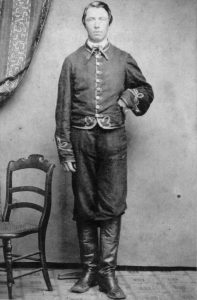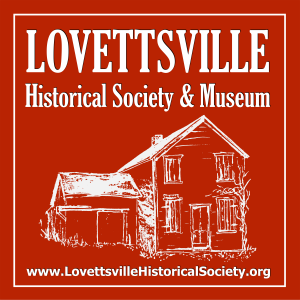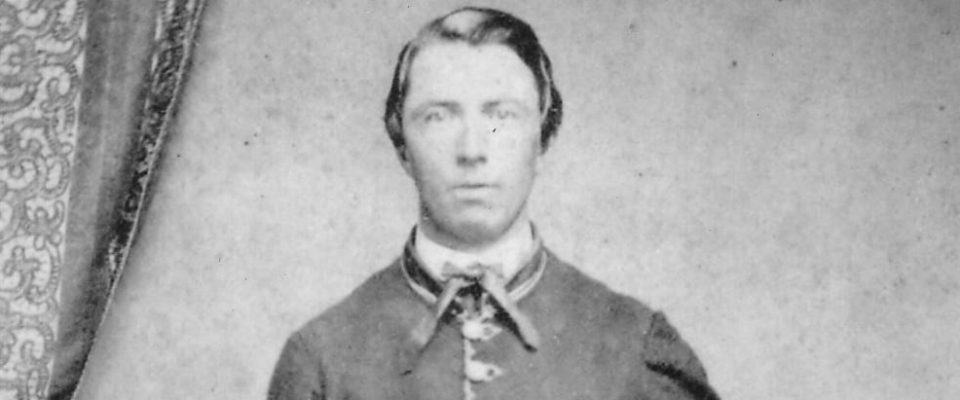By Edward Spannaus
In our December issue, we reported that a collection of the letters of Dr. James J. Henshaw was being lent to the Lovettsville Historical Society for scanning and transcription. These letters, which we are in the process of transcribing, shed a lot of light on life in the Lovettsville area during the Civil War.
When the Civil War began in 1861, Dr. Henshaw had been practicing medicine in Lovettsville and Loudoun County for over two decades.
In the May 1861 secession referendum, Loudoun also elected two delegates to the Virginia House of Delegates. Henshaw and W.F. Mercer, a Hamilton minister, ran as Unionists. They won the vote in the three northern precincts, but the pro-secession candidates carried the county overall and were seated as Delegates.
Later, in November of 1863, Dr. Henshaw was elected by Loudoun County Unionist citizens as one of their representatives to the House of Delegates of the Restored Government of Virginia, which was elected from the Unionist parts of Virginia, and which sat in Alexandria. In January 1864, Henshaw was appointed as Treasurer of the Unionist Government. And in a rump election held only in the Unionist areas of northern Loudoun County, Henshaw and two others were elected as delegates to a Constitutional Convention organized by the Restored Government, which took place in Alexandria from February through April 1864.
That is where Dr. Henshaw was staying, when the letter below was sent to him in February of 1864, by John W. Hough, a Waterford Quaker then living in exile near Burkittsville, Maryland, north of Berlin (now Brunswick).
Some more context will be helpful in reading this Hough-Henshaw letter.

John Hough had been part of the 56th Regiment of Militia in 1860, when the militia was mobilized after John Brown’s raid. Hough was an early volunteer in a precursor of the Loudoun Rangers,[i] called Paxson’s Troop of cavalry, which was formed in 1860 as part of the 56th to patrol along Loudoun’s northern border, the Potomac River. Hough had been censured by the local Quaker group (the Fairfax Meeting), for participating in military activities. When Paxton’s cavalry was dissolved in April 1861 – being by that time a mixture of secessionists and Unionists – Hough was “accepted back into the fold.”[ii]
But he remained a staunch Unionist, as you will see below, and as a consequence, he left Loudoun for Maryland. He had a lot of company: one-half of the 850 men in the 56th went to Maryland after secession, fleeing what was widely called a “reign of terror.”
Dr. Henshaw had worked as the Adjutant to Col. William B. Giddings in the mobilization of the 56th in the Spring of 1860, and this is likely how he knew Hough.[iii]
This letter below was written from Hough in Maryland, to Henshaw in Alexandria, at the time when the U.S. War Department had ordered a blockade of all trade across the Potomac, even with the north Loudoun Unionist citizens. This was triggered by complaints from the commander at Harpers Ferry, Brig. Gen. Jeremiah Sullivan, and others, about smuggling and abuses of the trading privileges that were allowed between Loudoun Unionists and Maryland. At the center of this was James Fillebrown, a former Colonel of the 10th Maine Infantry Regiment, who returned to Berlin as a civilian to set up a trading business. Fillebrown and his group, which included one James Hervey, had a monopoly on trade, and were forcing Loudoun farmers to sell grain and hay at low prices, and then they were jacking up the prices 2-3 times, and making big profits selling in Maryland.[iv] Here, Hough is denouncing Fillebrown and Hervey as scoundrels and rascals for robbing the people of Loudoun of their produce.
Near Broad Run, Feb. 21st, 1864
Dear Doctor,
I thought I would while away a portion of my time to day in writing to you as I have thought So often that I would write and would as often put it off. You will be surprised when I tell you that Ran[v] and I have let Berlin and are now boarding near Broad Run at Mrs. Hersberger’s. I like boarding out here first rate, as I think the whole family very nice people.
I am going to stay out here until it is so I can go over to Virginia as I told Bush, that I was going to quit until the blockade raised anyhow, but I do not think I will go back any more as I dislike the place so much that I think I will leave for good. John Stewart[vi] and Mr Fletcher was at Broad Run today at Church and I expect that Burr will be over with them this evening or tomorrow, as you know Burr is a regular visitor here.
I suppose you will have a grand display of flags tomorrow as it is Washington’s Birthday. Doctr I have ever had a great desire to see Washington’s Tomb and I am determined to see it while you are at Alexandria and I want you to go with me there as I want to have someone with me who has been there before so that I can see and understand all about it. I know you would be the best one I could have go with me there as you could show and explain everything relating to it. I want you to tell me when it will suit you best for me to come, and where I must come to meet you, as I do not wish to start until every thing is right. Have you any idea when this blockade is going to raise on the Potomac.
I think while you are having all those rascals arrested you had better see to old Sullivan and see if there is not a screw loose in him somewhere, for I do not think his military machine is in good working order. I hope you will give those other scoundrels their due for robbing the people of Loudoun of so much produce. I think you will find Fillebrown a grand Rascal and Hervey also, and all I wish for is for them to get a good searching of character. I believe I have not any news worth relating and will close by asking you to let me hear from you soon. Direct it to Burkettsville and I will get it through Burr.
Your Friend
J.J. Henshaw John W. Hough
Also of interest in the Hough letter, is Hough’s reference to Henshaw providing information to the military authorities at Harpers Ferry, which was used to arrest a group of “scoundrels.” This could be related to Henshaw’s role with the Union League, which was a clandestine spy network operating in the Lovettsville area and elsewhere, providing intelligence to the military authorities at Harpers Ferry — not necessarily to Sullivan who was regarded as ineffective, but to Capt. John McEntee of the War Department’s Bureau of Military Intelligence. (BMI).[vii]
The existence of this Lovettsville-area spy network was only discovered during Chamberlin’s and Souders’ research for the book Between Reb and Yank. Henshaw’s obituary states that he “was one of the original organizers of the Union League”[viii] –so there is obviously more to be discovered here.
To Be Continued….
[i] The Loudoun Rangers were an independent Unionist cavalry unit, formed in Lovettsville and Waterford in the summer of 1862.
[ii] Taylor Chamberlin and John Souders, Between Reb and Yank: A Civil War History of Northern Loudoun County, Virginia (2011), pp. 23-25, 33-35.
[iii] Ibid., p. 23.
[iv] Ibid., pp. 215-219.
[v] Likely Hough’s wife Miranda Stewart.
[vi] Possibly Miranda’s brother John.
[vii] Between Reb and Yank, pp. 251-252.
[viii] Obituary, Dr. J.J. Henshaw, Catoctin Clarion (Thurmont, Md.), February 22, 1894, can be accessed on Find-a-Grave here.

